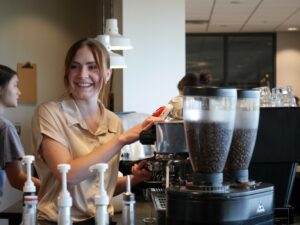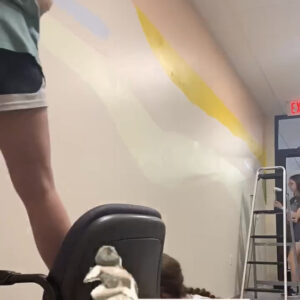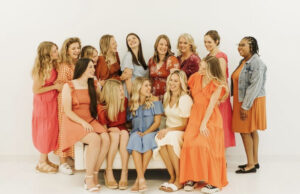
In Bartlesville, Oklahoma in 1950, a small school called Central Christian College welcomed its first professor. 64 years, a name change and a move to Oklahoma City later, Oklahoma Christian University bids farewell to the same professor, Harold Fletcher.
After serving in World War II and finishing his schooling, Harold took a job as a music professor in Tampa at the new Florida Christian College. Not long after he started, L.R. Wilson, the president of the school, was asked to move to a new endeavor in Oklahoma.
Accepting the move, Wilson, with a few members of the Florida Christian administration, requested Harold make the move as well. After some thought, Harold and his wife agreed to follow Wilson to Oklahoma.
“That’s how I happen to be here,” Harold said. “I was in Florida, and I took a job down there the year before the school opened in 1950.”
In his first years, Harold taught music theory, music literature, a course for song leaders and directed the choir. For the past several years, Harold has been teaching one course, music history.
“His class has been one of the hardest classes I have taken here, but really worth it,” senior Thomas Smith said. “I have learned a lot.”
Smith said he was impressed by Harold’s ability and desire to continue learning.
“Even though he has been teaching this class for 60 years… he still studies before he teaches class,” Smith said. “Sometimes he’ll come in and say ‘well I just learned this the other day’ because he is still reading new research that he’d never read before.”
Harold’s son, John Fletcher, studied under his father while in school at Oklahoma Christian.
“I took the same music history class that he is legendary for having taught all these years — that is such a challenging and fulfilling course,” John said. “…When I went on for some addition schooling, I actually decided to pursue music history more in depth, in part because of experiences I had in that class with him.”
Now, John is also a music professor at Oklahoma Christian alongside his father.
“It’s very rewarding for me to get to work with him,” John said. “…In the big picture, it has been a thrill for me to be side by side with him through the years.”
John, having grown up around Oklahoma Christian, has memories of some of Harold’s earlier years with the university.
“When I was a child, he was a co-writer for a music production that the university used to put on,” John said. “He and Dr. North… and some others… called ‘Songs America Sings.’ That was before Spring Sing, before homecoming musicals. They would write a musical production and put it on.”
However, before ‘Songs America Sings’ was a thought, Central Christian had several other performances.
“The first year at the end of the year in 1951 we produced the first stage production,” Harold said. “We presented a stage production of a well known folk opera ‘Down in the Valley’ that first year. The second year, we did two operas. Well, you don’t do things like that unless you have talent, you know.”
According to Harold, talent was not something the students of Central Christian lacked.
“I want to emphasize this: while there were differences in dress and numerous other things, we had superior students then who were the equal of any student body I have known since,” Harold said. “It is astonishing to me to think back to the year of beginning of the school that we had such good students. They were not all good, but there were plenty of them.”
However, despite the abundance in talent, performing Broadway shows was not an easy endeavor for the college.
“In those days, doing a Broadway show was pretty, nearly impossible in our context,” Harold said. “There were often people who were not satisfied with those as we had to cut things here and there. Cut out the dancing, for one thing.”
After Stafford North, Bible professor, joined the staff, Harold and North began co-writing their own performances. ‘Songs America Sings’ was a variety show, fitted specifically to the students.
“I remember lots of times hearing my dad and the others writing on that show and coming out to rehearsals and performance of that show,” John said. “…That’s a treasured memory for me.”
‘Songs America Sings,’ was performed multiple times during homecoming weekend and was held in the auditorium, which was then located in Cogswell-Alexander Hall, the current location of the Information Technology Department. The show ended in the late 1970s.
Throughout his years at Oklahoma Christian, Harold said his biggest memories come from the 1960s, a time of social and political turmoil due to the the Civil Rights Movement and later the Vietnam War.
“My relationship with the African-American students was one of the most important situations of my life,” Harold said. “I was on their side, as it were… that’s a big memory for me. The friendships and understandings that came as a result of that I guess is the biggest memory that I have of my entire career.”
Harold has made many contributions to Oklahoma Christian throughout his 64 years. One well-known campus addition is sung every Monday in chapel — the alma mater.
Towards the end of the first year, Harold realized the need for the fledgling school to have its own alma mater.
“I thought every school has a song, an alma mater, and we ought to have a song,” Harold said. “I thought we needed something that would hold the students to the place and us.”
Despite attempts to ask others to aid him in his mission, Harold ended up writing a song very similar to the one sung in chapel. Due to the change in name, the song is not quite the same as the original version.
At an end of the year banquet, a quartet was selected to sing the alma mater for the first time.
Harold said as he looks back on the words he wrote then, some seem trivial to him. However, one phrase sticks out to him.
“The one phrase that strikes me now… ‘may thy glories ever be…’ that’s a pretty big request to make,” Harold said. “But it is interesting, as I have thought recently, Universities last for a long time… So there wasn’t any wisdom in my using that phrase… but looking back on it I’m lucky I picked that cliche. It’s a good thing to want to have happen.”
Because of the longevity of Harold’s teaching career, he has earned the honor of being the oldest active college professor in the United States, according to NewsChannel 4.
“It’s a cool fact… it makes sense for Harold to be that,” Smith said. “Even now that he is retiring… he makes it seem like he doesn’t want to. It’s kept him young, teaching… It’s something that he lives for.”
Smith said he believes Harold will never stop learning.
“He’s probably going to just keep studying and doing the things that he loves,” Smith said. “That is just inspiring to me, to see the kind of love that he has for music and his interest level and really his brilliance and hopefully I can aspire to work as hard as he does.”
Harold taught his last class on his 91st birthday Thursday.
“The university has never had a semester when he was not teaching here… so I’m not quite sure how it will be,” John said. “One thing I am confident of is that he is going to study and read and want to learn whether he is teaching or not.”
Harold, however, said he will not be far away.
“Well, it’s been fun,” Harold said. “A lot of fun. I’ve enjoyed it.”














Be First to Comment